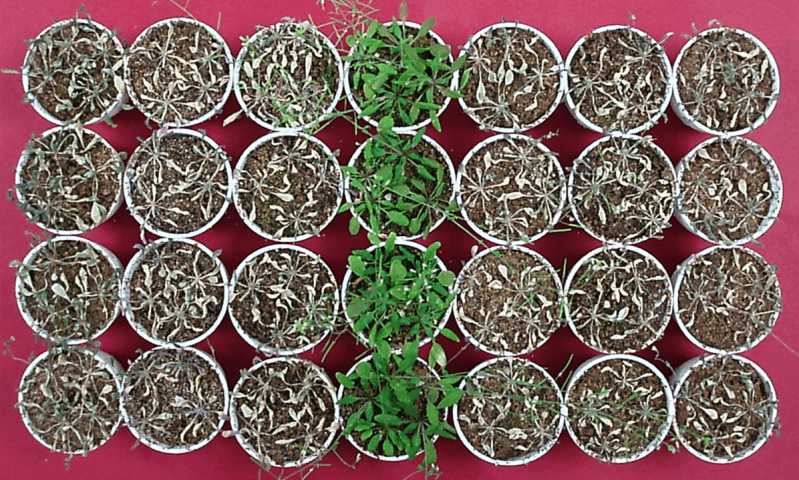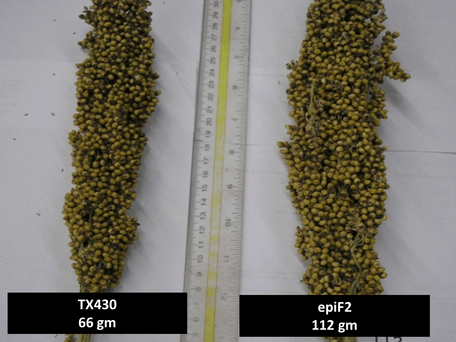For five years California was mired in a statewide drought, which ended this past April. Hundreds of thousands of farmland acreage in the state went unplanted because there was no easy way to combat the crisis.
But a recent study from researchers at RIKEN Center for Sustainable Resource Science suggest the farmer’s woes had a simple remedy to the lack of rain, and it could be found in their kitchen cupboards: vinegar. At least that’s the way the media reported it. But is that what the research concluded?
The study, published in Nature Plants, investigated the effects of growing Arabidopsis plants (a common model organism for studying crops) in vinegar. The results? Those grown in the common salad-dressing component had greater drought tolerance. Acetate (a central component of vinegar) triggered the activation of an epigenetically regulated biological pathway that, in times of stress, flips the plant from metabolizing sugar to acetate.
Normally, the pathway begins by producing an abundance of acetate, which triggers the metabolic switch from sugar to acetate. Interestingly, under drought conditions the more acetate an Arabidopsis plant produces the more likely it is to survive a drought. This led the RIKEN team to grow the plants in vinegar during a drought. Low and behold, those grown in vinegar survived at a much higher rate than those that weren’t.

The key finding: this mechanism was conserved in a few staple crops, rice, wheat and corn. Replicating the study with these crops produced similar results to the model.
So it’s that easy right? Drought is no longer a concern to farmers? Anytime the weather is expected to hot and dry, farmers could head to the grocery store to stock up on vinegar. That’s the impression readers may have gotten from some of the stories covering the study in the science, mainstream and farming press:
Phys.org: Vinegar: A cheap and simple way to help plants fight drought
Popular Science: Growing plants in vinegar could help them survive drought
Modern Farmer: Vinegar—A New Way for Crops to Fight Drought?
Sacramento Bee: Vinegar can help plants survive drought
Our **cough** friends at Natural News–the quack website promoted by many critics of conventional agriculture–had its own take on the study, twisting the results to take yet another jab at GMOs:

In fact, the study’s authors were the ones who first hinted at the idea that vinegar applications to relieve drought–unproven and untested–could better address crop environmental stresses than advanced conventional breeding or genetic engineering. Study co-leader Jong-Myong Kim said in the press release:
Although transgenic technologies can be used to create plants that are more tolerant to drought, we must also develop simple and less expensive technologies because genetically modified plants are not available in all several countries. We expect that external application of acetate to plants will be a useful, simple, and less expensive way to enhance drought tolerance in a variety of plants.
Reality check
Is this really the case? Should we forget about other solutions and focus on what appears to be the easy fix of vinegar? The science says probably not.
I spoke with crop epigeneticist Chad Niederhuth, a postdoctoral research associate at the University of Georgia. He said patience was needed when reacting to the study. One thing Niederhuth would want to know is to what degree unnaturally priming this pathway might impact crop yields long term. He said it doesn’t seem to be the case in their study, but there’s no way to know for sure until someone does it.
Nor is there any way to know yet what the effect on the health of the soil and microbiome will be of constantly spraying the land with an acid (vinegar is a solution of acetic acid). Acetic acid is actually more toxic than glyphosate, the current iconic villain of anti-GMO activists.
In the study, the actual discovery was made by mutating an epigenetic enzyme (histone deacetylase 6). I asked Niederhuth if there was any benefit to activating this pathway genetically and he said that priming the stress response with vinegar would likely produce a weaker physiological response than if the genes were altered.
The situation is akin in some ways to that of the Bt insect-resistance trait that is common to many crops (e.g. corn, cotton, eggplant). The Bt protein is an effective natural pesticide. It is derived from a bacterium and is approved in organic agriculture for topical use. But in some areas, farmers have to spray it constantly on their crops throughout the growing season for it to be effective.
For example, eggplant farmers in Bangladesh have to apply it to their fields as frequently as twice a week — dozens of times over the course of a growing season — to ensure their crops are not devastated by pests. The genetically engineered alternative–inserting the natural bacterium directly into the genomes of crops–allows plants to produce the Bt protein on their own, which drastically reduced the need for pesticide application to as little as once or just a few times a season.
Fewer applications translates to far lower chemical exposure rates for farm workers, many of whom are women and children, and major economic savings. And with the need for fewer passes across the land with the tractor, Bt crops have been a boon for the environment.
Genetic engineering solutions
Considering the reality that the ‘vinegar solution’ remains unproven, and far into the future if it should indeed pan out, what are nearer term alternatives? A crop that has the gene for histone deacetylase6 altered to trigger the acetate pathway on its own wouldn’t require a steady exogenous supply of vinegar. It’s not a large leap to predict similar benefits as Bt.

Furthermore, it wouldn’t necessarily have to be a transgenic crop. Histone deacetylase 6 induces epigenetic changes. So, in theory, these crops could be created by targeting these modifications.
Also, these crops likely won’t face the regulatory hurdles others have because they do not involve a change in the gene sequence.
While no epigenetically modified crops exist on the market currently, they are progressing quickly. One company, Epicrop, has had an abundance of success in boosting yields in sorghum by modifying the plant’s epigenetics.
Actually, despite what the study’s authors said, transgenesis (the movement of genes from one species to another) doesn’t present any major technical challenges. The study involved a mutation of an already occurring sequence in the Arabidopsis genome, a sequence that is conserved (i.e. the same or very similar) in corn, rice and wheat. The mutation only has to be replicated in those crops in a similar way. In other words, the crop may not have to be a GMO at all.
On the other hand, Niederhuth said research into genes and stress tolerance has faltered in some cases because having a constant stress tolerance mechanism creates problems of its own. Vinegar application may be a compromise if it’s used in a targeted way. His main point, and it’s a good one, was that only time and science will tell. Until the science is clearer, all potential solutions should be pursued.
So, nobody should be stocking up on vinegar in hopes of rescuing a rain-starved crop–at least not yet.
Nicholas Staropoli, founding director of the Epigenetics Literacy Project, is a contributing writer and editor. BIO. Follow him on Twitter @NickfrmBoston.































